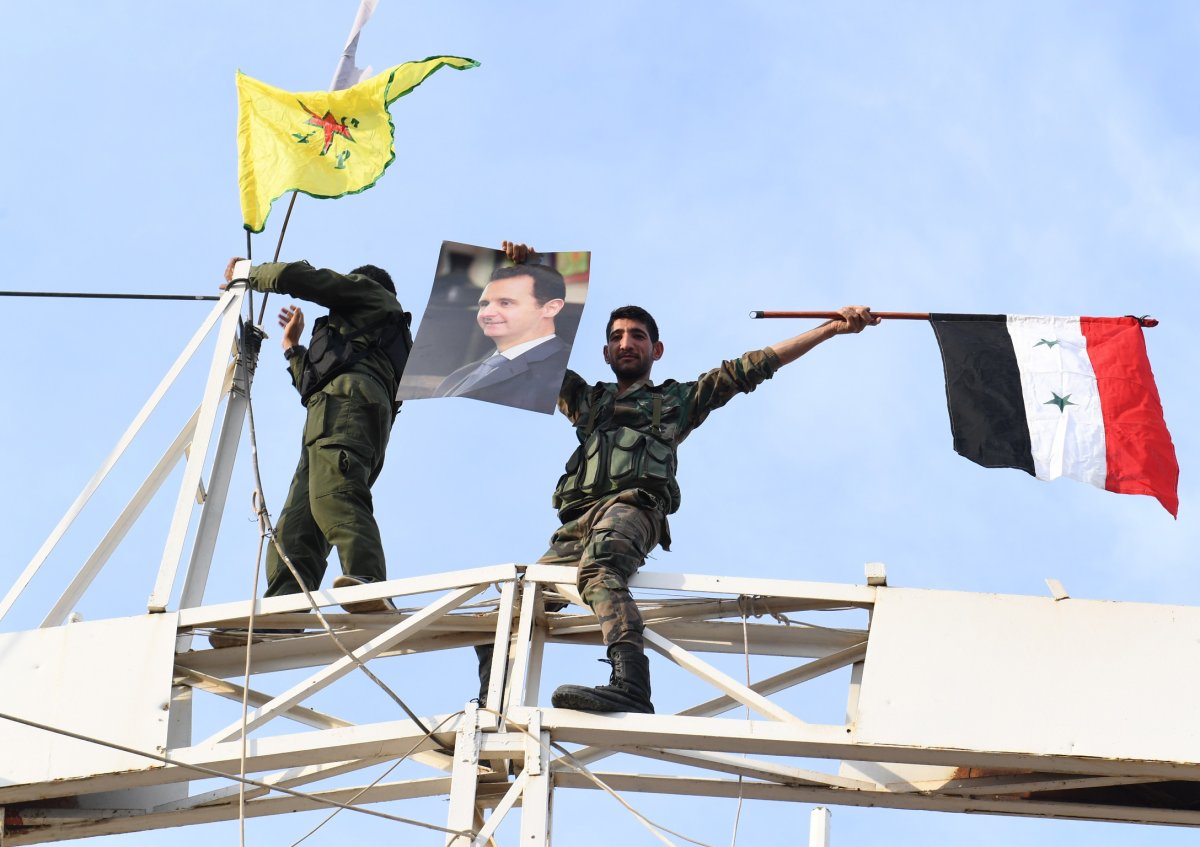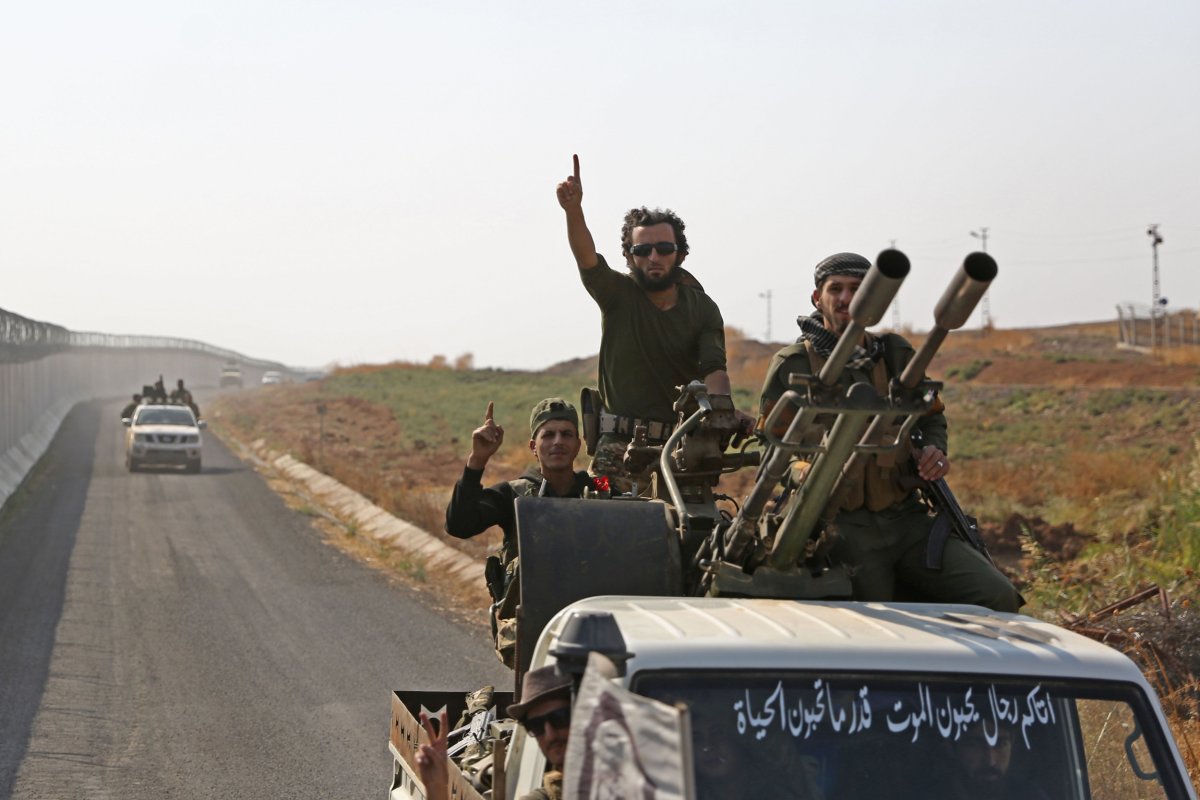Syria has called on U.S.-backed, mostly Kurdish militias to officially join the country's armed forces as both factions faced new insurgent violence that threatened a ceasefire agreement reached last week by Russia and Turkey.
In a press statement addressed to the Syrian Democratic Forces, the Syrian Defense Ministry said Wednesday it was ready to accept any units of the Kurdish-led group willing join the ranks of the Syrian military in a joint effort to battle invading Turkish troops and the Syrian rebels they support. The ministry offered reconciliation to those not needed for security purposes.
"We in Syria face one enemy and we must exert with the sons of a united Syria, from Arabs and from Kurds, our blood to recover every inch of the beloved Syrian territory," the official Syrian Arab News Agency described the message as saying.
The outlet also cited the Syrian Interior Ministry as offering to extend civil services across the self-ruling northeast, noting the difficult living conditions due to the Turkish-led incursion and offering to integrate the Syrian Democratic Forces' Asayesh security forces into the government's internal security agency. The Syrian Ministry of Education offered to support children there as well, noting how they have been deprived of schooling due to the unrest.

The U.K.-based, opposition-tied Syrian Observatory for Human Rights, which carried reports Wednesday of continued fighting across multiple axes in northeastern Syria, carried a response from the Syrian Democratic Forces.
"We appreciate efforts to unify Syria's defense and repel the Turkish aggression against our country and our people," the statement said. "Our position was clear from the beginning, wherein uniting the ranks should begin from a political settlement that recognizes and preserves the exclusivity of the SDF and its structure, and creates a sound mechanism for restructuring the Syrian military establishment as an overarching framework for unifying efforts."
"Likewise, the members of the Syrian Democratic Forces, in all their different forms, and in front of the world, have been the best Syrian fighters who fought against the Islamic State and destroyed its alleged caliphate in defense of Syria and the world as a whole," the statement continued. "Therefore, these heroes deserve praise and honor and not the settling of statuses and decrees of amnesties like those that are issued against criminals and terrorists."
It concluded: "We also affirm that the members of the SDF are disciplined soldiers and a military organization with an institutional structure. We absolutely reject this language of speech directed at individuals, as first the Syrian Ministry of Defense should address its speech to the General Command of the Syrian Democratic Forces, in order to open the door of a sincere desire to unite efforts and not circumvent the reality to shirk its responsibilities."
Syrian Democratic Forces commander Mazloum Abdi, also known as Kobani, responded as well. The Syrian Kurdish leader, who around this time last year said he would "raise the Syrian flag" if Damascus recognized the Syrian Democratic Forces part of "a national force," also criticized the manner in which the Syrian Defense Ministry approached his militia.
"The form and approach of the Syrian Ministry of Defense's statement and its call for members of our forces to 'engage individually' to the Syrian army is not welcome," Kobani tweeted Wednesday. "Rather, the ministry should offer a solution in light of what we have proposed, which is to preserve the SDF's exclusivity in its areas of presence in order to be part of the Syrian defense system."
The exchange highlights a history of mistrust among two factions with common foes, but differing visions for Syria's future.

The Pentagon partnered with the Syrian Democratic Forces in 2015 as efforts to overthrow Syrian President Bashar al-Assad through an Islamist-dominated opposition were increasingly abandoned and defeating the Islamic State militant group (ISIS) became the primary goal. Turkey, still backing the rebels, opposed this alliance as it considered the Syrian Democratic Forces' primary component, the People's Protection Units (YPG), to be an extension of the banned Kurdistan Workers' Party (PKK).
The separatist PKK had launched cross-border activities out of Syria for years, but Damascus cracked down in 1999 to improve relations with Ankara. When the civil war broke out in 2011, Kurds in northern Syria formed the YPG, which alternatively worked with and against the Syrian government and the opposition.
The U.S. supported the YPG as it fought ISIS as part of the Syrian Democratic Forces, but stood aside when Turkey mounted two operations to clear Kurdish fighters from the border regions they won the jihadis. President Donald Trump ordered the withdrawal of U.S. troops embedded with the Syrian Democratic Forces on the onset of a third Turkish operation earlier this month, leading to the majority-Kurdish force to strike a deal with the Syrian government, which has reclaimed much of the country with the support of Iran and Russia.
With Syrian troops and allied Russian forces manning frontline positions once held by the U.S., Russian President Vladimir Putin and Turkish President Recep Tayyip Erdogan managed to strike a ceasefire. The arrangement would halt Turkey's attack and see the withdrawal of the YPG from a stretch of territory across the border and, though both sides claim to have adhered to the deal, the death toll continued to climb in northern Syria.
As the Syrian Ministry of Defense attempted to court the Syrian Democratic Forces on Wednesday, Syrian troops were seen withdrawing from the conflict's frontier, leading the Syrian Democratic Forces to blame Russia for not fulfilling its security obligations. Ultimately, however, it was the U.S. who remained in control of much of the region's airspace, even as it prioritized securing oil fields in the east.
"NE Syrian airspace is owned by the US. It has been open to Turkish aircrafts since Oct. 9 for Turkish army and its jihadists to attack the region (21 days). No cease fire, humanitarian situation has sharply deteriorated," Syrian Democratic Forces spokesperson Mustafa Bali tweeted Thursday. "People are undergoing an ethnic cleansing campaign by TR."
Uncommon Knowledge
Newsweek is committed to challenging conventional wisdom and finding connections in the search for common ground.
Newsweek is committed to challenging conventional wisdom and finding connections in the search for common ground.
About the writer
Based in his hometown of Staten Island, New York City, Tom O'Connor is an award-winning Senior Writer of Foreign Policy ... Read more
To read how Newsweek uses AI as a newsroom tool, Click here.








